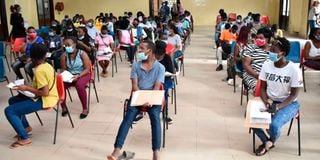Coast colleges to train students on key maritime skills to boost Blue Economy

First Year students at Technical University of Mombasa wait to register as learning resumed across the country in January this year.
Institutions of higher learning in the Coast region are taking advantage of their proximity to the Indian Ocean to structure academic programmes that offer courses on oceanography, fisheries and maritime.
The new courses aim to promote the country's agenda on harnessing the Blue Economy, a sector that is not fully tapped.
The Technical University of Mombasa (TUM), has for instance introduced courses in Marine and Maritime Technology, encompassing marine engineering, shipping and maritime commerce.
TUM Vice-Chancellor, Prof Laila Abubakar, says that in addition to the courses, the university will explore innovations that tap into renewable energy harnessed through wind and ocean tides. Being a technical institution, TUM is known for the medical, electrical, civil and mechanical engineering courses.
TUM also offers various technical and vocational training courses that award certificates, diplomas and craftsmanship qualifications.
"Because of our history as a polytechnic, our students are more hands-on since we have most of the equipment, as a result, graduates from TUM are known for their skilled expertise, says Prof Abubakar.
Maritime excellence centre
Meanwhile, the Kenya Coast National Polytechnic in Mombasa, formerly Mombasa Technical Training Institute, has embarked on the construction of a maritime excellence centre in Waa, Kwale County. The centre will see over 300 trainees get training on key maritime skills in an effort to boost Kenya’s Blue Economy.
The chief principal, Ann Mbogo, said the World Bank-funded project has succeeded since the strategic plans are already in place.
“We have a lot of potential and are lucky to be strategically located at the Kenyan Coast. With the training, most of the young people will be able to take up employment in the maritime sector,” she told Higher Education, adding, “We want to empower the youth, not just for our Blue Economy but also be skilled enough to export labour.”
The five-year project will enter its second year in June, it includes the construction of a hostel for international students and marine engineering workshops.
Experienced seafarers
For seafarer training, Ms Mbogo says there will be an elaborate hospitality department, a department for beauty and another for animation.
Further, the institution targets to sharpen skills of experienced seafarers to upgrade their skills to fit the current market requirements through offering short courses.
“We will empower many workers who have hands-on experience so that they acquire seafarer certificates and enable them to work in different parts of the world,” she says, adding that many of the residents were already skilled but did not have the necessary certificates.
The institution has collaborated with TVET CDACC in the development of CBET curriculums for port logistics level 6, cruise animation level 5, and 4, marine welding level 5 and 4, marine painting level 4 and marine blasting level 3.
The institution is in the process of establishing MOUs and linkages to facilitate exchange programmes, trainings and benchmarking with institutions such as Bandari Maritine Academy, Institute of Chartered Ship Brokers, Qingdao Harbour and Vocational Institute as well as Caribbean Maritine.
Others ate Arab Maritine Academy (Egypt) and World Maritine University. These institutions will offer mentorship in the establishment of Centre of Excellence in Marine Transport and Port Logistics EA Regional Centre.





